What Each Introverted Myers-Briggs® Personality Type is Skeptical Of
Today I want to dive into skepticism, questioning, and what it has to do with your Myers-Briggs® personality type. Certain personality types are notoriously skeptical (I’m looking at you, INTPs), while others are considered to be more lenient and accepting. But I believe it’s more complex than that. I think everyone is skeptical, but about different things.
Today I’m looking at the eight introverted Myers-Briggs® personality types, and then over the weekend I’ll publish an article specifically for the extroverted Myers-Briggs personality types. I’m doing this because sometimes in the process of trying to fit all 16 types into one article I often find that people get overwhelmed with the scrolling and sheer enormity of the articles (they’re usually 5000+ words, so I don’t blame them!)

Not sure what your personality type is? You can always take our questionnaire to find out!
Estimated reading time: 12 minutes
What Each Introverted Myers-Briggs® Personality Type is Skeptical Of
The INTP
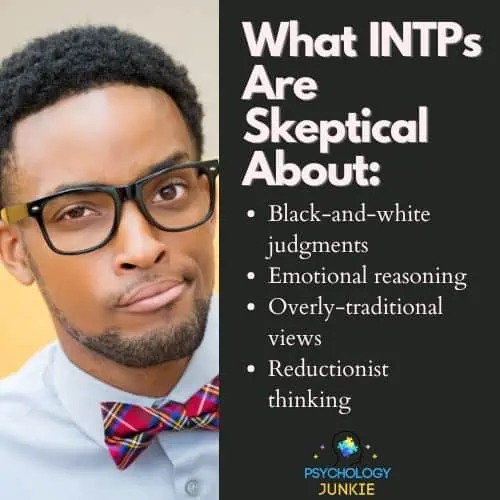
Of course I have to start with the INTPs, because they’re skeptical about pretty much everything. Why? Let’s thank their Introverted Thinking side for that, paired with a process called Extraverted Intuition.
INTPs have a constant need for logical consistency and coherency. Logical fallacies are anathema to them, and they’ll easily pick out any inconsistencies in an argument. This is why they’re often viewed as the “devil’s advocate” or the “eternal skeptic.”
However, INTPs also have a side that craves new ideas and perspectives – Extraverted Intuition plays a major role here. They love exploring different possibilities and theories, finding connections that might surprise most other people. To them everything is connected, and everything can be explored or understood in 12 or more different ways.
Because of this, INTPs are especially skeptical of:
- Emotion-based decisions and feelings
- Narrow-minded judgments
- Quick decisions
- Black-and-white perspectives
- Faith-based conclusions or judgments
- Judgments based on personal-experience or tradition
- Conclusions that lack factual basis
- Reading things at face value
I mean, we could probably add more to this list. INTPs, drop me a comment and let me know what should be added because I know I haven’t covered it all!
Find out more about INTPs: The Top 35 Favorite INTP Movies
The INFP

Next up, the INFPs, who are no strangers to the depths of internal questioning. While they may not spend a lot of time arguing about the semantics of someone’s words or evaluating logical fallacies in an argument, they have an attunement to hypocrisy or lack thereof. Their dominant function, Introverted Feeling, drives them to constantly evaluate and re-evaluate their inner values, feelings, and motivations. They don’t just accept “surface” feelings; they dig deeper, seeking to understand the roots of their emotions and beliefs. Their actions must align with their values, the things they tell others they believe in. And if other people act differently than what they preach, INFPs will definitely pick up on that.
INFPs also use a process called Extraverted Intuition, which helps them to see connections between many different ideas, experiences, and details. Everything is connected and it all is rich with meaning to the INFP. This makes them inherently curious and open-minded, always on the lookout for new ways of understanding or interpreting their surroundings. They detest narrow-mindedness and snap judgments, preferring instead to explore all facets of an idea or argument.
Naturally then, INFPs are skeptical of:
- Judgments that don’t consider personal context
- Decisions made without empathy
- Black-and-white thinking
- Traditions or norms that stifle individuality or creativity
- Any form of intolerance or close-mindedness
- Quick fixes or superficial solutions to deep issues
- Criticism that lacks constructive intent or understanding
You might also like: 21 Songs That INFPs Will Relate To
The INTJ

INTJs are often called the Strategists, and for good reason. Woe to anyone who tries to take them on in a game of Risk! They are Introverted Intuitives, which means they have an in-depth understanding and interest in ripple-effects, patterns, and deeper meanings. They’re also focused on mobilizing resources in order to achieve their goals; using logic, logistics, and an eye for opportunity to make the most of their abilities. Hence, the Risk domination.
This Intuitive capability makes them exceptional at predicting outcomes and planning several steps ahead. But it also means they’re skeptical of decisions that revolve around emotions, tradition, or whatever will satisfy everyone’s “comfort zones.” And many INTJs, while interested in spirituality, feel uncertain about many faiths because they can’t find enough empirical evidence or they find themselves arguing about the inconsistencies in various religious texts.
Because of these combined qualities, INTJs are skeptical of:
- Emotional displays that seem manipulative or overly dramatic
- Arguments based solely on popular opinion or social consensus
- Decisions made without a logical or empirical foundation
- Short-term solutions that fail to consider long-term impacts
- Ideas that lack innovative thinking or are bound by traditional methods
- People who avoid taking responsibility for their actions or blame external factors for their problems
- Strategies that ignore underlying systemic issues or patterns
Find out more about INTJs: Why INTJs Struggle with Loneliness (and How to Cope)
The INFJ

The INFJs, often known as the Mystics or Advocates, try to balance skepticism with an awareness that not all things can be explained empirically. Their dominant function, Introverted Intuition, gives them the power to perceive deeply entrenched patterns and meanings in the world around them. Joel Mark-Witt and Antonia Dodge from the Personality Hacker podcast describe this well: “The number of different patterns inside of us is only limited by the number of humans on the planet. But there are patterns to these patterns, and the Perspectives user (INJ types) naturally enjoys digging into the different ways people interpret reality.” This profound understanding and search for meaning allows INFJs to read between-the-lines, understand unsaid emotions, and gain insight into the inner workings of people’s minds.
What truly sets INFJs apart is their empathic nature, combined with their intuitive perception. They possess an uncanny ability to deeply understand and empathize with individuals on a personal level. This empathy allows them to take emotional considerations into perspective effortlessly. INFJs can easily shift their viewpoint to understand another’s, which probably explains why so many take up careers in counseling or religious support. This talent not only helps them to make sense of their own inner world but also helps them understand what motivates others.
Given their deep empathy and intuitive insight, INFJs are inherently skeptical of:
- Actions and decisions that disregard the potential emotional impact on others
- Surface-level interpretations
- Social structures or policies that seem inconsiderate of the individual’s unique circumstances
- Rigid thinking or solutions that fail to address the root cause of problems
- Quick decisions without time for contemplation
- Judgments that don’t make room for abstract considerations (i.e. “I only trust what I can see, hear, touch, smell, so everything outside of that is wrong!”)
Discover more about INFJs: 10 Extremely Annoying INFJ Pet Peeves
The ISTP
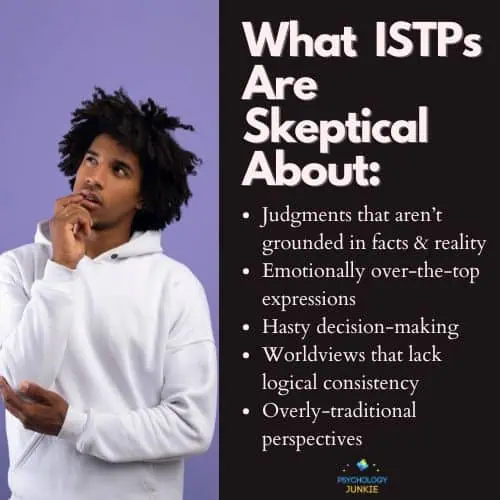
ISTPs, who I like to call The Vigilantes, are the personification of cool pragmatism. These types want to know how everything works. They’re the types of people who don’t just play a piano, they know how the piano works, can tune the piano, and could probably turn it into a self-playing piano given enough time and enough tools (and no, not all ISTPs play the piano). ISTPs are deeply questioning by nature. They trust what they can perceive through their senses, but they also know that not everything can be experienced in a sensory way. In childhood, they are often masters at hairsplitting, finding ways to prolong or win arguments over things they see as completely illogical.
Like INTPs, ISTPs can spot logical inconsistencies a mile away. Emotional manipulation, hasty generalizations, slippery slope arguments, and the like are no match for them. They know that it’s impossible to know everything, but that doesn’t stop them from trying.
Because of their nature, ISTPs tend to be skeptical of:
- People who make hasty decisions without considering the facts or evidence
- Emotionally-charged judgments or decisions
- Ideologies that reject practical, real-world applicability in favor of abstract principles
- Black-and-white thinking that ignores the nuances and grey areas of complex issues
- Judgments based purely on someone’s life experience or traditions
- Religious beliefs that seem to have logical inconsistencies or little real-world proof
- Assertions made without firsthand experience or solid proof to back them up
Find out more about ISTPs: 10 Things That ISTPs Look for in a Relationship
The ISFP
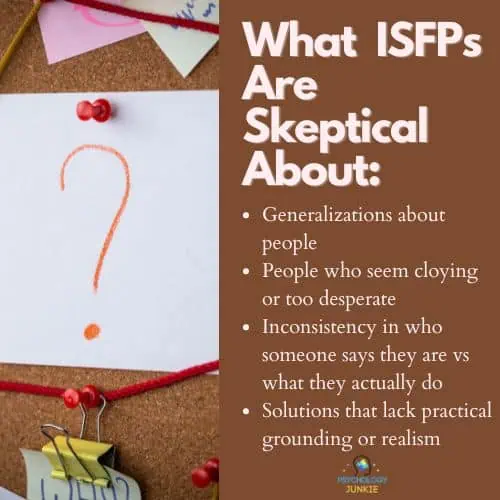
I like to call ISFPs the Virtuosos, because every ISFP I have known has a creative interest that they have mastered or are in the process of mastering. These types blend a unique mix of realism with a deep and passionate inner life guided by their values. While ISFPs aren’t always on the hunt for logical inconsistencies, they are skilled at detecting phoniness or manipulation. They tend to express themselves selectively, gauging someone’s authenticity level right away. They’re like the cats of the Myers-Briggs world, carefully watching and eyeing people to see if they can be trusted. But once they get close to someone, their loyalty runs very deep.
ISFPs notice when people say one thing and do another. They are skeptical of people who seem to be putting on a show or trying too hard to win others over. They are also realists, and while they might embrace an interest in concepts or mystical ideas, they still prefer relationships with people who can stay fairly down-to-earth.
Given their unique blend of traits, ISFPs tend to be skeptical of:
- People who make broad generalizations about others without appreciating their individual nuances.
- Decisions that fail to consider personal values, seeming shallow or misguided as a result.
- Solutions or ideas that lack practical grounding or realism
- Emotional expressions that appear exaggerated or performative
- Ideologies or systems that enforce conformity, stifling personal expression and individuality
You might also enjoy: How ISFPs Say “I Love You”
The ISFJ
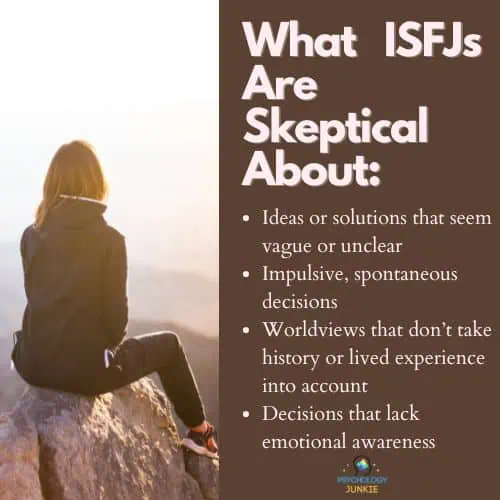
ISFJs aren’t really the people that most people think of when they hear the word “skeptical.” Words like “nurturing,” “kind,” and “grounded” come to mind. Most ISFJs aren’t fond of arguing, and many would prefer harmonious relationships to one’s filled with suspicion (I guess that last part is true for most personality types). But this doesn’t mean that ISFJs just accept everything without question. They often have an inner skeptic, a side to themselves that few see that can easily untangle the logical inconsistencies in someone else’s judgments (or their own). But you may never SEE this inner skeptic. Unless one of their core values is at threat, ISFJs will tend to keep the peace over getting into a war of words.
But let’s talk a little bit about ISFJs. They are grounded, down-to-earth, and focused on creating meaningful routines. They like a stable, consistent life, and warm, harmonious relationships. They care about getting people’s needs met, in either emotional or practical ways. Helping out in their communities, having a dependable lifestyle, these are all things that deeply matter to them.
Because of their grounded, conscientious nature, ISFJs tend to be skeptical of:
- Trends or fads that encourage spontaneous or risky behavior
- Decisions or judgments that don’t take others’ needs and emotions into account
- Proposals that lack a clear, practical plan for implementation
- People that exhibit inconsistency or unreliable behavior
- Ideas or movements that disregard the importance of tradition and history
- Overly abstract or theoretical concepts that seem disconnected from real-world applications
Discover more about ISFJs: 24 Signs That You’re an ISFJ, the Protector Personality Type
The ISTJ
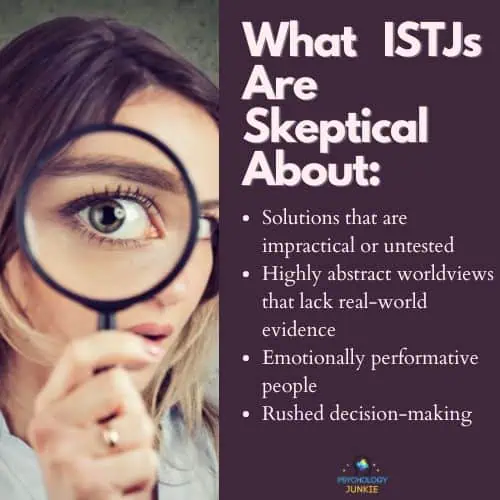
ISTJs may not look as outwardly skeptical as the INTPs on this list, but they still have a deeply questioning nature. For ISTJs, perceptions should be based on reality, facts, and evidence. Life should be organized around community, tradition, and responsibility. While ISTJs hate pointless arguments (they’ve got a to-do list to get to), they also aren’t easy to manipulate. They trust what they know through experience, their senses, and carefully-weighed logical analysis.
Let’s talk a little bit about what makes ISTJs tick. ISTJs view the world through a lens of past experience and history. They glean wisdom from the past in order to create a more stable and secure future. They’re also pragmatists, organizing and structuring their world in a way that makes sense logically. They believe in approaching life with a calm, cool-headed approach, and are known for their reliability and dependability.
Given their practical, no-nonsense nature, ISTJs tend to be skeptical of:
- Wild or impulsive behavior that disregards consequences
- Decisions made without considering past experiences
- Concepts or ideas that lack real-world applicability or evidence to support them
- Emotional reactions that seem out-of-proportion or irrational
- Changes to traditions or routines without a solid reason for doing so
- Theoretical concepts or philosophies that seem disconnected from practical reality.
You might also like: 10 Things That Excite the ISTJ Personality Type
What Are Your Thoughts?
Did you relate to what I wrote about your type, or do you have a different opinion? Let me and other readers know in the comments!
Find out more about your personality type in our eBooks, Discovering You: Unlocking the Power of Personality Type, The INFJ – Understanding the Mystic, The INTJ – Understanding the Strategist, and The INFP – Understanding the Dreamer. You can also connect with me via Facebook, Instagram, or Twitter!

References:
Personality Hacker: Harness the power of your personality type to transform your work, relationships and life by Joel Mark-Witt and Antonia Dodge (Ulysses Press, 2018)
I’m Not Crazy, I’m Just Not You by Roger R. Pearman & Sarah C. Albritton (Nicholas Brealey Publishing, 2010)



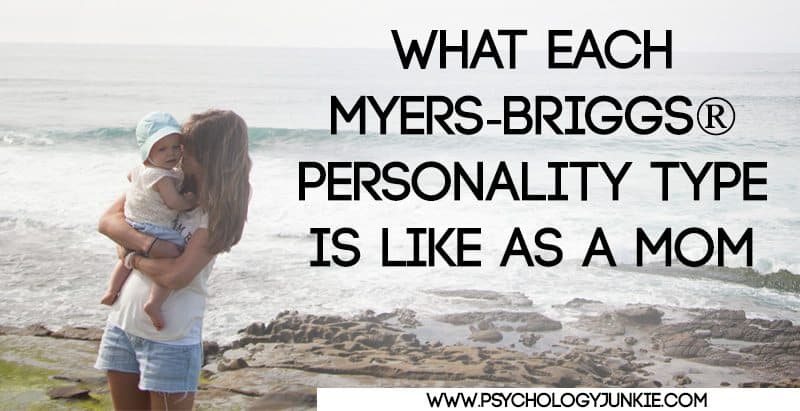


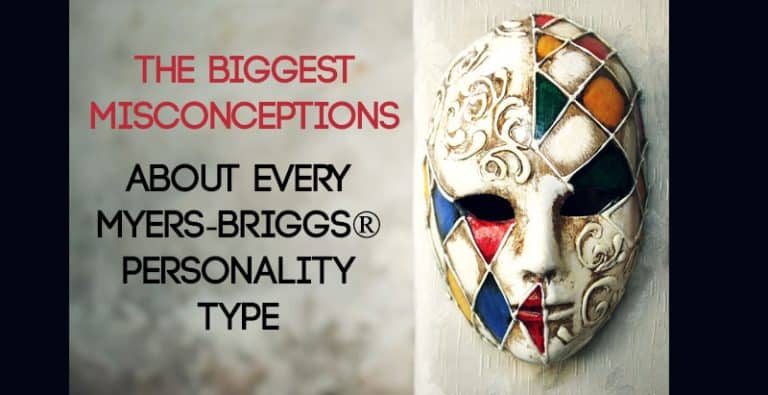
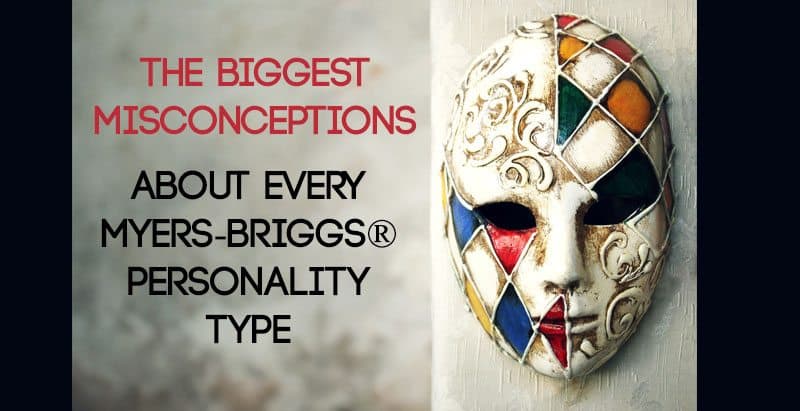




Thank you, Susan.
Your knowledge of personality types is breathtaking. I learn so much from you.
Are you sure you’re married?
As an INTP I’ve accepted many things at face value (which can get me into trouble, especially when others hold different definitions of words), partly because I apparently lack the ability to read between the lines or discern sarcasm or subjective opinions. I also doubt my own judgment on unfamiliar topics and so am inclined to accept others’ viewpoints, at least at first, as I assume that they know more than I. However there’s also a difference between being skeptical and simply digging for more. Summary information is often insufficient, and as I do find conflicting facts intolerable most of the questions I ask are for the purpose of reconciling these. I also find “personal preference” as a reason for others’ choices to be a non-answer, as even preference is based on something even as superficial as color or a cute commercial. Conversely, I do seem to conceptualize and grasp mental images more easily than Sensors, which makes sense (npi) given how these take in information and need to see and experience something to be convinced.
As a “dyed-in-the wool” INTP, I find I am always HIGHLY skeptical when someone produces a statement of fact, but cannot produce evidence to support said fact. Also **EXTRAORDINARILY** irritated when things are done because “that’s the way we’ve *always* done it!”
Some other things to add to INTPs:
-large generalizations that don’t consider nuance nor outliers. (Like “That’s how things always go.” or “Everyone relates to this.)
-Using “It’s true because I heard it from so-and-so reputable/high-ranking person.” as a fact or argument.
-idk how to explain this one very well but using metaphors as evidence???? I go to a religious school and NFJs always do this. (Like this is definitely good for you because it is like pure calming water which cleans your dirty heart. One that really annoyed me recently was that “too much of x thing is bad because it is like a mole on a face, a single mole enhances beauty but too many ruins the face.)
I do look forward to your newsletter each day I get one. With 5 children, I don’t know how you do it, but keep it going.
I’m very skeptical that I will ever satiate my search for truth in one lifetime.
Forer/Barnum Effects making scientifically unfounded claims from thin air would be a good addition to–well, pretty much any type’s list, since the Barnum/Forer Effect strategies will result in unsuspecting minds overanalyzing which type they are because they use faulty logical reasoning “I like hot showers so I’m probably an ENFP, but I also piss while standing, so am I an INTJ instead?” Somehow blind to the fact that these things actually aren’t specific to any particular personality in the first place.
Since ENTJ s are left out, I could assume we have nothing to be skeptical about but for me personally as a female ENTJ, I’m skeptical of things that are too good to be true so I will need some cold, hard facts to remove that skepticism.
Another thing is the “nicey nice” people; anyone trying the love bomb nonsense can kick All the rocks. Lastly, the people who say they have life, death, and the in-between all figured out when they haven’t died for a meaningful amount of time, talked to God to about the Truth of existence, and toured all the heavens and hells to be able to support their so-called facts. I could go on but will step down from the soapbox now.
Hi! There is an article that includes ENTJs. I just split this series into introverts and extroverts to cut down on scrolling for people. You can see the extrovert edition (with ENTJs) here: https://www.psychologyjunkie.com/what-each-extroverted-myers-briggs-personality-type-is-skeptical-of/
As an INTJ— AMEN! —Thank You for your work and understanding!